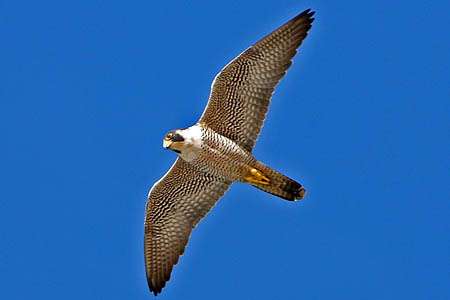Police are appealing for information after the discovery of the bodies of two peregrine falcons.
Tests carried out on the pair confirmed they had been poisoned by a banned pesticide.
The deaths of the protected birds near St Just in Cornwall follow the killing of a buzzard and four goshawks in Devon that had also been poisoned with the illegal chemical carburofan.
The Royal Society for the Protection of Birds has offered a £1,000 reward for information leading to a conviction.
The peregrines were found by a member of the public in July after being spotted hunting near their cliff-side nest just hours earlier. Test results confirmed this week the birds’ bodies contained high levels of the banned substance.
PC Jack Tarr, wildlife crime officer in Cornwall, a keen birdwatcher who has been involved in monitoring peregrines for 12 years, said: “That these magnificent birds should be killed in this way is truly shocking. This was a pair I’d regularly enjoyed watched myself hunting off the coast at St Just and I know they were popular with many other people who walked the cliffs there.
“We need to find out who did this and bring them to justice.”
Tony Whitehead, spokesperson for the RSPB in the South-West added: “To have confirmed two bird of prey poisonings in as many weeks is unprecedented. We know that Devon and Cornwall have always been a persecution black spots and this year looks as though it might be one of the worst on record.”
“We need to stop this. Whatever drives people to do this, it’s important to understand that killing birds of prey is not only barbaric, it is also against the law.
“This makes the perpetrators, however they seek to justify their behaviour, no more than common criminals and we’d expect them to be treated as such.”
Anyone found guilty of an offence against birds of prey can be liable to a fine of up to £5,000 for each offence imprisonment for up to six months, or both.
Dr Elaine Gill, Natural England’s regulation team leader in the South West said: “The use of illegal chemicals like carbofuran poses a significant threat to our wildlife and environment – in this case, causing the needless death of two peregrine falcons after they ate bait laced with poison.
“Peregrines receive special protection under the Wildlife and Countryside Act (1981) and poisoning them is an offence, as is the possession or use of carbofuran, which has been banned for more than a decade.
“We treat such incidents seriously and will continue our work with other enforcement agencies under the wildlife incident investigation scheme to tackle incidents like this.”
Anyone with information can call Crimestoppers anonymously on 0800 555 111 or phone 101 quoting crime number AP/11/1922. Alternatively, the public can contact the RSPB on 0845 466 3636.

![[CC-2.0]](/lib/img/layout/cc-attr.gif)